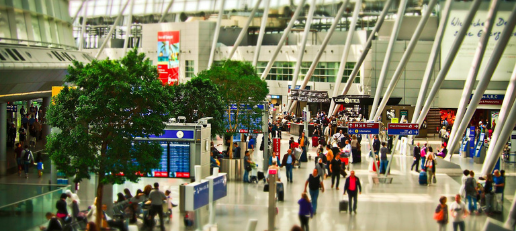
THR's opinion
Easter 2022 – Tourism Finally Recovering?
Introduction
Data is showing that tourism is at least partially beginning to return to pre-pandemic figures. But are we really at the beginning of the post-pandemic recovery of the tourism sector?
Tourism tanked during the pandemic
The tourism sector has been one of the most affected by the pandemic. According to data from Statista, international tourist arrivals worldwide in 2020 fell by almost 75% compared to 2019.
In the case of Spain, a country where tourism accounts for a large share of the economy, tourism GDP in 2020 fell by 69%, air traffic plummeted from 275 million passengers in 2019 to 76 million in 2020, and travel agencies had their turnover reduced by almost 75%, as well as losing around 9,000 jobs.
After this devastating effect in 2020, 2021 followed as the year of massive vaccination and hope. However, fear of infection, new strains of the virus, outbreaks and restrictions prolonged the consequences for the sector and limited its recovery.
2022: another re-beginning of the recovery?
Despite the war in Ukraine, widespread inflation and the challenging economic context, several data points indicate that the industry recovery is finally arriving.
The sector is highly optimistic about the Easter holidays, which are expected to exceed the results of the same period in 2019. Nonetheless, war is influencing international travelers’ destination choices. Places furthest away from the conflict - such as Spain, Portugal, or Greece – are seeing their bookings increase compared to more challenging "hot spots", among which Poland stands out due to its geographical proximity to both Russia and Ukraine.
According to data from SiteMinder, at the end of March, hotel bookings globally stood at an average of 87% compared to 2019 figures for the same period. Some countries such as Spain are already exceeding pre-pandemic figures, with 106% of bookings compared to the previous year, or Portugal with 105%. Others, such as France, are very close to the full recovery of hotel bookings. Moreover, certain destinations of great international interest, such as Barcelona, have registered jumps of more than 120%.
This optimism is also reflected in the bookings of major tour operators such as TUI Group. The group reported that its bookings have been mostly unaffected by the war and highlighted that by March it recovered already 80% of 2019 summer booking levels. Consequently, the tour operator announced that it would start repaying state aid granted due to the pandemic.
In parallel, corporate travel is showing a strong positive trend. According to the mobility platform Free Now for Business, 55% more corporate travel was recorded in January 2022 compared to the figures for 2021. It is also worth mentioning that major international trade fairs such as the Mobile World Congress (MWC) have returned to their face-to-face format, bringing together more than 60,000 attendees.
Nevertheless, we should not take our eye off the different threats on the economy such as the increase in fuel and energy prices, which could have a major impact on international mobility and hinder the recovery of the sector. In addition, Russia and Ukraine’s war continues and there is uncertainty on how the pandemic will develop during the following months.
In Sum
Two years after the beginning of the pandemic, the tourism sector defines Easter holidays as "the first solid step towards recovery". Despite the geopolitical and economic instability, optimism is widespread, and the data seems to be supporting it.
We will be on the lookout for the evolution of the situation, hoping to finally overcome these two very difficult years for all of us.